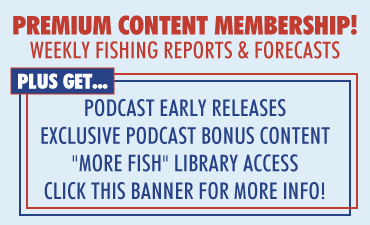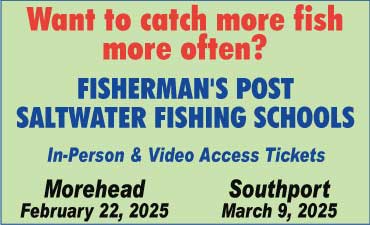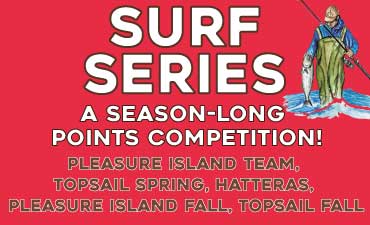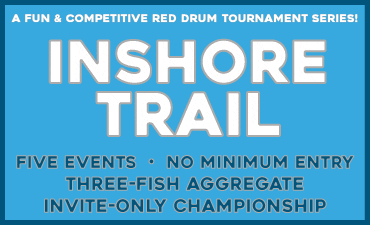Releases – September 15, 2011
The Outer Banks Center for Wildlife Education will partner with Ducks Unlimited and the U.S. Fish and Wildlife Service for a National Hunting and Fishing Day in North Carolina event at Mackay Island National Wildlife Refuge on Saturday, Sept. 24.
The day of fishing and outdoor fun begins at 8:00 a.m. and continues until 3:00 p.m. For $25, each participant will receive a rod and reel combo, tackle, a T-shirt, Fish-For-Fun bags, and a Greenwing membership. Pre-registration is required. Lunch and beverages will be provided for participants and their families.
This day of fun includes: exploring Mackay Island Wildlife Refuge and looking for eagles; learning bow safety and how to shoot a bow with the N.C. Bowhunters Association; visiting “Citation Station” to see if your fish can be registered in the N.C. Angler Recognition Program; and entering the longest and heaviest fish contest.
The Outer Banks Center for Wildlife Education is a N.C. Wildlife Resources Commission visitor and learning facility at Currituck Heritage Park on Highway 12 in Corolla, next to Currituck Beach Lighthouse and the Whalehead Club. On National Hunting and Fishing Day in North Carolina, the center will offer laser shot demonstrations onsite and classes on fishing in Currituck Sound from 10:00 a.m. to 3:00 p.m. Call (252) 543-0221, ext. 1 for reservations. Also, visit the exhibit gallery or see the movie “Life by Water’s Rhythms.”
National Hunting and Fishing Day in North Carolina will be celebrated cross the state and is an example of year-round efforts by the N.C. Wildlife Resources Commission to educate, encourage, and involve people in hunting and fishing. The Commission offers free hunter education courses, Becoming an Outdoors-Woman workshops, outdoor skills classes, youth hunts, disabled sportsmen and mobility impaired hunting and fishing opportunities, and a fishing tackle loaner program.
National Hunting and Fishing Day, formalized by Congress in 1971, was created to celebrate the conservation achievements of hunters and anglers that benefit all who appreciate wildlife and the outdoors.
For more information on N.C. Wildlife Resources Commission wildlife and fishing education centers, hunter education programs, and what it takes to become a North Carolina sportsman, go to www.ncwildlife.org.
For more information on National Hunting and Fishing Day, visit www.nhfday.org.
The N.C. Marine Fisheries Commission recently voted to open the fall flounder gill net fishery in Pamlico Sound on Sept. 19 with certain conditions. The commission also voted to open the fall flounder gill net fishery in southern Core Sound, Back Sound, The Straits, and North River on Oct. 1.
The Pamlico Sound Gill Net Restricted Area will initially open seven days a week under the same regulations and permit requirements as previous years. Under these regulations, the Pamlico Sound Gill Net Restricted Area must close to all large-mesh gill nets for the remainder of the fall fishing season if the fishery has interactions with three live or two dead Kemp’s ridley sea turtles.
However, if there is an interaction with a Kemp’s ridley sea turtle, N.C. Division of Marine Fisheries Director Louis Daniel will reduce the fishing days to six. If there is a second interaction with a live Kemp’s ridley, the number of fishing days will be reduced to five.
The commission also authorized division Daniel to implement stricter regulations, if needed. Core Sound, Back Sound, The Straits, and North River will open under regulations established by a sea turtle lawsuit settlement. Under this agreement, these waters must close to set large mesh gill nets for the fall season if there is one interaction with either a live or a dead Kemp’s ridley.
By federal rule, all of Pamlico Sound closes to large-mesh gill net fishing from Sept. 1 through Nov. 30 each year. The closure began in 1999 after several instances of fishery interactions with threatened and endangered sea turtles. Fishermen typically use large-mesh gill nets to target flounder.
Since 2000, the National Marine Fisheries Service has allowed a highly-monitored, large-mesh gill net fishery during the closure in limited areas of the sound under a series of Incidental Take Permits. These permits, authorized under Section 10 of the federal Endangered Species Act, allow for limited takes of threatened or endangered species in an otherwise lawful activity.
North Carolina’s latest Incidental Take Permit for the Pamlico Sound Gill Net Restricted Area expired Dec. 31, but the National Marine Fisheries Service recently agreed to allow the fishery for the fall of 2011 while it reviews the state’s application for a new permit to include all gill net fishing in internal coastal waters statewide.
In May 2010, the N.C. Division of Marine Fisheries submitted an application for a statewide Incidental Take Permit to cover set gill nets statewide, including the Pamlico Sound Gill Net Restricted Area. However, National Marine Fisheries Service review of the application was delayed due to the Deepwater Horizon oil spill in the Gulf of Mexico.
The division was notified Aug. 24 that the application was received and deemed complete. The National Marine Fisheries Service intends to publish a notice of receipt in the Federal Register in the coming weeks.
Core Sound, Back Sound, The Straits, and North River closed to set large mesh gill nets July 18, in accordance with a lawsuit settlement, after division observers documented several interactions with sea turtles.
North Carolina’s inshore large-mesh gill net fishery has operated under a lawsuit settlement agreement between the state and the Karen Beasley Sea Turtle Rescue and Rehabilitation Center since May 15, 2010. As part of the agreement, the division is observing large-mesh gill net fishing in inshore waters to track interactions with sea turtles. The fall flounder fishery in the Pamlico Sound Gill Net Restricted Area is exempt from the lawsuit settlement restrictions and operates under a separate set of regulations.
NOAA Fisheries released its Fisheries of the United States 2010 report. Fisheries of the U.S. is an annual snapshot of the landings and value of U.S. fisheries. This year it contains some good news—landings were up and the values of those landings were up. U.S. commercial fishermen landed 8.2 billion pounds of seafood valued at $4.5 billion in 2010, an increase of 200 million pounds over 2009 and an increase in value of more than $600 million from 2009.
Today’s report also highlights the top U.S. ports including our leader for the 22nd consecutive year, the Alaska port of Dutch Harbor-Unalaska. And, for the 11th consecutive year, New Bedford, Mass., had the highest valued catch, due in large part to the sea scallop fishery.
Another aspect of the report is seafood consumption. In 2010, the average American ate 15.8 pounds of fish and shellfish, a slight decline from the 2009 figure of 16 pounds. On a global scale, the U.S. continues to be third-ranked for consuming fish and shellfish, behind China and Japan. Imported seafood continues to increase to help fill consumer demand—about 86 percent of the seafood consumed in the U.S. was imported from overseas.
You can read the full report online at www.noaanews.noaa.gov/stories2011/20110907_usfisheriesreport.html
The Seacoast Anglers Association will meet Monday, Sept. 19, 2011 at 6:30 pm at the VFW Post 10804, Route 57 & Route 9, in Little River SC. The club’s happy hour starts at 5:30 pm, where the VFW has food and beverages.
The club’s guest speaker will be Mickey Thompson from the Marine Service Center. He will be speaking about winterizing your boat. If you like to fish, like to hang out with fishermen and fisherwomen, then the club invites everyone to come learn and swap lies.
For more information, you can contact Gary Whiteleather at (703) 303-5632.
The N.C. Division of Marine Fisheries will reopen its license sales office in the N.C. Department of Environment and Natural Resources’ Washington Regional Office at noon Tuesday. The office temporarily closed April 4. Fishermen may purchase Coastal Recreational Fishing Licenses, commercial fishing licenses, vessel registrations and various fishing permits during normal business hours.





